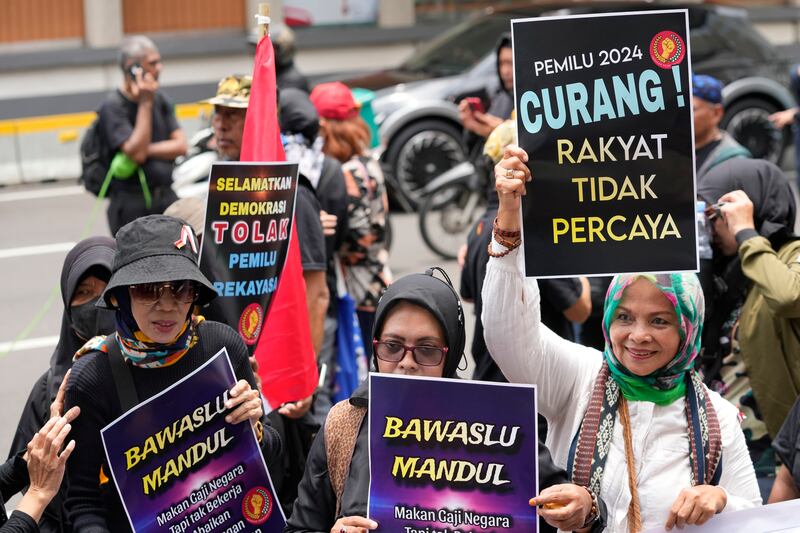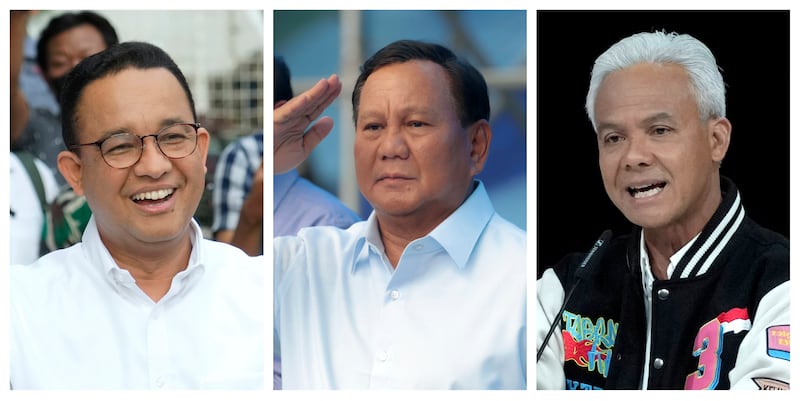The two Indonesian presidential contenders who lost to former Gen. Prabowo Subianto in last week’s election have called for a parliamentary inquiry into alleged fraud at the polls.
Both candidates, Anies Baswedan and Ganjar Pranowo, claimed that widespread irregularities such as vote-buying and intimidation marred the Feb. 14 election.
They have urged the parties backing them to launch a parliamentary probe to investigate the allegations and seek legal remedies. However, they face an uphill battle, because they will need the backing of more than half of the 580 lawmakers in the House of Representatives (DPR) to start an inquiry.
“We think it’s a good initiative by Mr. Ganjar to propose a parliamentary inquiry,” Anies told reporters on Tuesday.
“We are confident that the Change coalition of Nasdem Party, PKB and PKS will be ready to join,” the former governor of Jakarta said, referring to the alliance of political parties that backed his candidacy.
On Monday, Ganjar, who finished third in the election, said he had suggested the idea of a parliamentary investigation to his Indonesian Democratic Party of Struggle (PDI-P), the country’s ruling party, and its allies in the DPR. However, he said the proposal needed more support from other parties to meet the requirement.
According to unofficial quick counts by pollsters, Prabowo, the defense minister in President Joko “Jokowi” Widodo’s second and final term, won the presidential election with about 58% of the vote. The apparent decisive victory means the election will not go to a second round in June.
Anies and Ganjar, the former governor of Central Java province, received 25% and 17% of the votes, respectively, the unofficial counts showed.
A final count will be released by the General Election Commission by the end of March.
Prabowo, the former son-in-law of the late dictator Suharto, has been accused of human rights abuses when he served as a general with the army's special forces. He is on track to replace Jokowi, who is constitutionally limited from contesting a third term, in October.

Ganjar said the fraud allegations must not be ignored, as he urged lawmakers to summon election organizers for questioning.
“If the alleged fraud is swept under the rug, there are no checks and balances. This must be investigated,” Ganjar said in a statement released by his campaign.
Anies said his team had found evidence of widespread irregularities and violations in the pre-election period that influenced the voters’ choices and did not reflect their true aspirations.
“We have seen the practice of pressure and vote-buying before people went to the polls, which could potentially become a problem. If such practices had not existed, the election would not have been decided in one round,” he said.
Prabowo's decision to pick Jokowi's eldest son, Gibran Rakabuming Raka, as his running mate has raised concerns among some Indonesians about dynastic politics and nepotism.
Asked about the inquiry proposal, Jokowi said: “Go ahead. This is a right that comes with democracy.”
Jokowi, who did not publicly endorse any of the candidates, last week dismissed the cheating allegations. He said the election process was watched by many people, including representatives of the candidates, the election supervisory agency and security personnel.
Critics alleged that his government had used force, tampered with government materials and influenced the judiciary to ensure victory for Prabowo and Gibran, 36.
Anies’ camp on Feb. 15 alleged that the Prabowo camp had used underhand tactics to gain a higher vote count, saying there was evidence of pre-marked ballots, voter intimidation, voter-list manipulation and vote buying.
Last week, Ganjar said his party and its coalition partners had launched an investigation into possible fraud. He called it “anomalous” that the counts showed him receiving the lowest number of votes in the presidential contest, while his PDI-P party was projected to have the highest number of votes in the legislative elections.

Gibran, the mayor of Solo, benefited from a controversial ruling by the Constitutional Court in October that revised the minimum age for presidential and vice-presidential candidates from 40 to any age for those who have served as regional heads.
The court's chief justice, Anwar Usman, who is married to Jokowi's sister, was dismissed from his post in November because of ethical violations linked to the ruling.
Critics, including faculty members from more than a dozen universities across the country, have accused Jokowi of straying from democratic principles and attempting to create a political dynasty by advancing his relatives.
Jokowi also has been accused of using populist measures such as early handing out of social aid early, raising salaries for civil servants, police and the military, which critics say were aimed at boosting Prabowo’s chances.
Possible inquiry
Wasisto Raharjo Jati, a researcher from the National Research and Innovation Agency, said a parliamentary inquiry would not affect the election result if Prabowo had the most votes in the official count.
He said an inquiry by lawmakers would only produce recommendations related to the election process.
“The recommendations will depend on the specific findings of the inquiry,” Wasisto said.
Dedi Kurnia Syah, executive director of Indonesia Political Opinion, a research institute, said an inquiry could lead to Jokowi’s impeachment.
“Basically, now it’s a matter of competing for votes in Parliament. If Jokowi doesn’t get more support from the rival parties in the presidential election, he faces a high risk of being impeached,” he told BenarNews.
Indaru Setyo Nurprojo, a political observer from Jenderal Soedirman University in Purwokerto, said the inquiry was unlikely to happen.
He said the first hurdle would be to unify PDI-P.
“There are factions that opposed Ganjar’s presidential bid. In Central Java, PDI-P won, but Ganjar lost,” he told BenarNews.
Pizaro Gozali Idrus in Jakarta contributed to this report.
